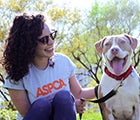 |
| Pit Bulls like this one, who was not part of the case, were rescued in the Vick raid. |
“This was one of those moments in time when the involvement of an extremely high-profile celebrity in a horrific act prompted universal public outrage. The good that came out of it was that almost every dog seized from the property was saved and has a second chance at living a fulfilled life.”
—Ed Sayres, ASPCA President & CEO
The 2007 indictment of then-Atlanta Falcons quarterback Michael Vick led to historic changes in the animal welfare field and the nation’s perception of dog fighting. Prior to the investigation, dog fighting cases involving federal authorities were extremely rare. The Vick case, which involved two arms of the federal government, the United States Department of Agriculture (USDA) and the Department of Justice, put the blood sport on the map as a federal offense.
Dog fighting is now banned throughout the United States and has gone from being a felony in 48 states to being a felony in all 50 states. Those convicted of federal animal fighting charges face up to three years in prison for each guilty count.
ASPCA's Involvement in the Case
“During the Michael Vick case, our forensic veterinary skills helped to produce the evidence that led to a guilty plea. Our ASPCA PhD behaviorists and their expertise led to us working with the Department of Justice and the USDA to evaluate and provide disposition recommendations for the dogs seized during the investigation.”
—Dr. Stephen Zawistowski, ASPCA Science Advisor
The Michael Vick investigation began in April 2007 with a search of Bad Newz Kennels, located on Vick’s Surry County, Virginia, property. The ASPCA assisted in the recovery and analysis of forensic evidence from Vick’s property, including carcasses and skeletal remains of numerous Pit Bulls. The evidence helped to convict the football star of operating a competitive dog fighting ring, a federal offense that resulted in a prison term for Vick and three co-defendants.
The ASPCA also led a team of certified applied animal behaviorists in behavior evaluations of the rescued dogs, making recommendations to the USDA and U.S. attorney’s office regarding the dispositions of the dogs. The team was led by the ASPCA’s Dr. Stephen Zawistowski, Dr. Randy Lockwood and Dr. Pamela Reid.
The Dogs
Of the 49 Pit Bulls evaluated by the ASPCA-led team, only one was deemed behaviorally unfit for rehabilitation and recommended for euthanasia. A federal judge determined the final disposition of the 48 remaining dogs, who were then taken in by sanctuaries, rescues, foster homes and adopters throughout the country.
Twenty-two of the dogs were taken in for rehabilitation and long-term care by Best Friends Animal Society Sanctuary in Kanub, Utah. Some have been adopted or placed in foster care, and the rest are making great progress. One of them, named Georgia, made an appearance on The Ellen DeGeneres Show.
California Pit Bull rescue Bay Area Dog Lovers Responsible About Pit Bulls (BAD RAP) also took in many of the Vick dogs.
Find out where the Vick dogs are today.
Timeline of the Vick Investigation
- July 17, 2007: Vick and three co-defendants are indicted by a federal grand jury on dog fighting charges.
- August 27, 2007: Vick pleads guilty to a federal charge in connection with a dog fighting operation on his Virginia property. As part of Vick's plea agreement, he places almost 1 million dollars restitution into a fund used to care for and rehabilitate the animals.
- November 19, 2007: Vick surrenders to U.S. Marshals three weeks before his December 10 sentencing date in order to begin serving his prison sentence early.
- November 30, 2007: Two of Vick’s co-defendants, Purnell Peace and Quanis Phillips—who pleaded guilty to several charges, including conspiring to travel in interstate commerce in aid of unlawful activities and to sponsoring a dog in an animal fighting venture—receive sentences of 18 and 21 months, respectively, which fall on the higher end of the federal sentencing guidelines. Both are put on probation for an additional three years, during which time they are prohibited from having any contact with dogs.
- December 10, 2007: Vick is sentenced in Richmond, Virginia, to 23 months in federal prison, followed by a three-year probation period that forbade him to own or have any contact with dogs other than supporting humane organizations.
- April 10, 2008: At the U.S. Attorney's Office Law Enforcement Public Service Awards ceremony, presided over by Chuck Rosenberg, U.S. Attorney, Eastern District of Virginia, four ASPCA team members are recognized for their invaluable assistance in the Vick investigation.

 Facebook
Facebook Twitter
Twitter Pinterest
Pinterest Email
Email Print
Print




